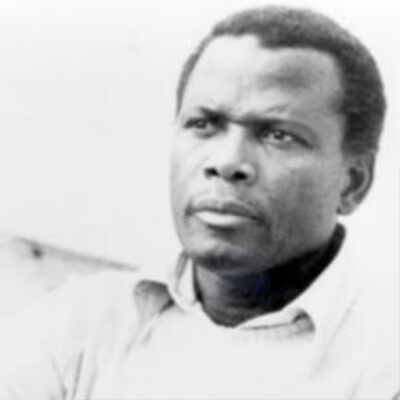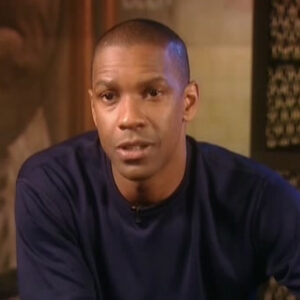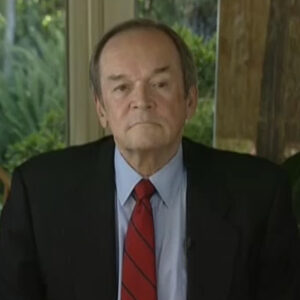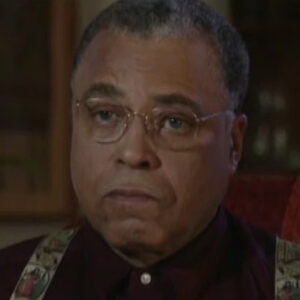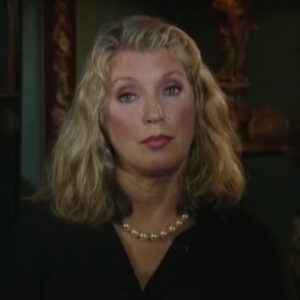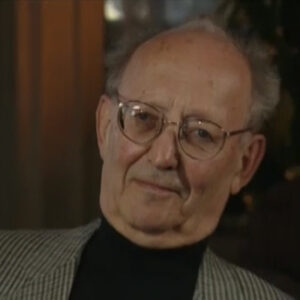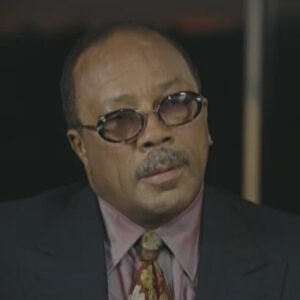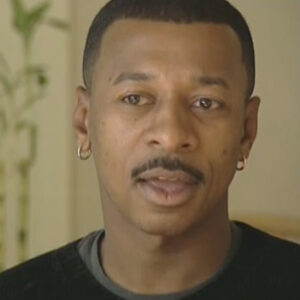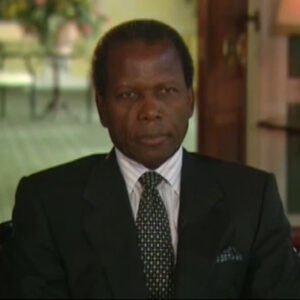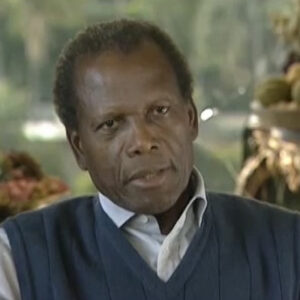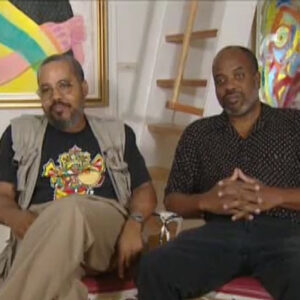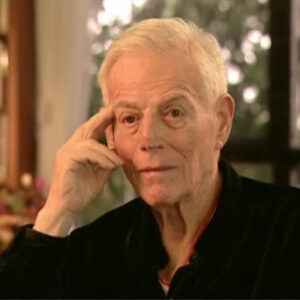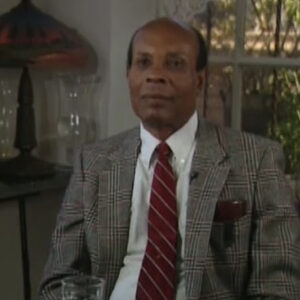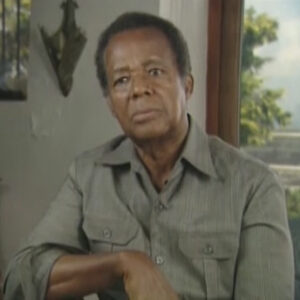Speaker Since we have left, Sydney has told us, especially this morning, about his very special relationship with Kendall. He talked about him as a national hero, as an icon. Tell me how far back Sir Kendall and Sidney went and how they became such close friends.
Speaker Well, I think I mentioned earlier that I met Sidney when I was I think in my early 20s. I was in London and studying there. And Sidney had just finished the film Cry The Beloved Country. And he came to London and he was very friendly with an uncle that I had. And he saw me. And we I made friends with him then. But then, of course, I was I stayed in London for another five or six years. And Sidney went on to become more famous as an actor. And Kendall was at home most of the time that I was in England.
Speaker And of course, when I came back, he and Sydney were quite friendly, but they knew each other from they were boys at school.
Speaker Know, Sidney said that that Kendall was a middle class boy and he was, of course, a poor little tomato farmer. So he always admired him. Yes.
Speaker Yes. Kenny was known. I think actually, Kendall said to me once that as a young man, he was always preaching to people, telling them or, you know, you shouldn’t do this or you shouldn’t do that. But I think he got over that because he became a lawyer and a very successful lawyer. And at one time in the Bahamas, there was a great deal of colour separation. And I think Sidney made a film, which they didn’t. The ruling party at the time didn’t want to be shown here. And Kendall and a group of his friends got together and protested this. And I think eventually the film was shown. I can’t remember really. No way out. It was no out. That’s right. Yes. And when I came home, Sidney was an established movie star and he and Kendall were good friends. Then, in fact, Sidney built a house next door to Kendall’s house when he used to live in an area in the Bahamas called Winton. And so by the time I got home and and settled in the after ten years in England, he and Sydney were close friends. And of course, I met Sidney as well again, and we became friends. But I didn’t get real close to Sidney until I got married to Kendall. And then, of course, Sidney was an established movie star. He lived in California in Bel Air. And we visit him out there several times and I got to know him better and went on a few holidays together. And that’s when. And then I realised how close Cantlon Sidney was before that scene.
Speaker Yeah. Well, wait til the plane goes by.
Speaker Give me a chance to get justice, but there’s something sticking out just a little while. OK.
Speaker I should have brought a operation, technical training. Yes, you are Arcanum and certainly about the same age.
Speaker Yes, yes. It’s always been, you know, which one was 70 and which one was 71. But I think Sydney was at least a year or two younger than Kendall.
Speaker Yes. You quite that dog.
Speaker I’m sorry. Say it again. Right about Sydney, about Sydney and Kendall in Sydney and Kendall, practically the same age we always used to laugh about.
Speaker Which one was older than the other. But I think Kendall was about two years older than Sydney, but they were the same age and they were in school together. We all went to public schools. When I when I say public schools, that’s the American system of public schools.
Speaker Of course, the British system of public school is Eton, though, Harrow, one of those places. But we went to public schools, which is like your American public school.
Speaker So with a guy only two years older than he is, how come he felt about him that he was his mentor?
Speaker I mean, he was talks about his brain and his candor was always known to be a very bright young man, very bright.
Speaker And when he was young, he in fact, he used to say to me, he said to me after we were married that he wondered why people liked him so much when he was young, because he was always preaching to people, you know, this isn’t the right thing to do. The next thing wasn’t the right thing to do. And I think that’s how he grew up. He grew up in a family of 11. Yes. I think he had five or six sisters and five brothers. And he was the baby. Yes. And I’ve known Kendall all my life because he lived a few blocks down from me at the street down from me. And a lot of people thought we were related because I haven’t my my uncle my father’s brother was married to Kendall sister. So it was always an aunt or an uncle in the family. And of course, Kendall and I grew up together.
Speaker Well, you people have cousins everywhere and anywhere you go in the Bahamas, you’re going to find somebody that knows this one or the other one.
Speaker Yes. Because you saw Gail the other day. And that’s kind of nice. Yes, yes. Yes.
Speaker What made him so brilliant?
Speaker I don’t know. He was bright. He was bright all through school and became a school prefect. And he was also a very good sportsman. Countless you know, most children have to work hard to to attain the scholarship, but can’t do that.
Speaker He just came naturally to him. But the family was bright. He had a brother who was extremely bright. But Kendall was the only one that was able to go off to university because all the brothers and sisters worked and they started work as soon as they left high school. Some of them didn’t even go to high school. But Kendall joined the army. I think he was either 17 or 18. He left school and was working as a customs officer.
Speaker Hold it. Yeah, that’s a little yes, it’s yes, it’s what it’s dog walking time down here, which is people just come home from work, you see.
Speaker Sorry about that. That should be all right for well.
Speaker But how can somebody only two years old be a mentor?
Speaker I mean, Cindy talks about him, worship him.
Speaker But I think when Kendall came back, went after Campbell finished university, he went in the army, as I said. Then after that, he went off to Cambridge and he did very well at Cambridge. And then he became he went to London and became a lawyer and he came back to the Bahamas and was practicing fairly successfully. And that’s when Sidney used to come back and forth to the Bahamas.
Speaker I was in England at that time and they got to know each other and respected each other. And of course, Campbell loved Sidney and respected Sidney. You know, he said Sidney had a brain that he could do anything he wanted to. So I said to him once, well, it’s a good thing he didn’t go to Cambridge because he would not have been a successful actor, you know? And so he always admired Sidney, the the feelings that Sidney had for. It was reciprocal, believe me. He thought a lot of Sydney will be Sidney is an icon for the Bahamas.
Speaker And we all think a lot of Sidney and even though I don’t know, you’ve just come back from Kerala and in the Bahamas, whenever Sidney came to Nassau in a film, it was always homeboy.
Speaker They called him home boy. He certainly was a home boy. And we all loved Sidney. And he and Kendall struck up a close friendship which lasted until Kendall died. And I would always be so grateful to Sidney and love him forever because Sidney was in South Africa making the film Mandela, and he came back to Nassau to give the eulogy at Kennedy’s funeral.
Speaker It must have been hard. Yes, yes. For all of us.
Speaker Yes. When Kendall went into politics, they still maintain a friendship, maintained a friendship. And all of us, I should say, both Sidney and myself and Kendall, we all supported the party at the time because, you know, the Bahamas is a small place in politics, played some great part and friendships and what have you. And both Sidney and Kendall were strong supporters of the CLP, the government at that time. And when Kendall.
Speaker Well, let me just go back to that, because the CLP explain it to people, to audiences who don’t know. And it’s the group that overthrew.
Speaker That is quite right. White colonial. No, quite right. But you tell it to us so that they can understand.
Speaker Yes. But I believe I when I spoke the other day, I mentioned that Sidney always told us that just before it was it must have been in December nineteen sixty six because the party won the big election in January sixty seven. And I think Sidney was Sidney told us that two days before the election pending who was the leader of the opposition then became our prime minister. He phoned Sidney and asked if we could get some walkie talkies. We didn’t have any walkie talkies and they needed them for the next day. And Sidney said it was a Sunday and you have to get people up out of their shops to go and get these walkie talkies. And Kendall was also very committed to the party, although at the time he was, I think, Attorney-General for the Bahamas. And as such, he couldn’t get directly involved in politics because as a civil servant, you know, you have to appear to be neutral on your dealings, must be neutral. But they both supported the CLP. And unfortunately, I don’t know, I should say fortunate, but when when the Kendall got disillusioned, became disillusioned with the CLP long before Sydney did, and then eventually Sydney and came to realise that they felt they had to you know, they felt the same way about what was happening in the Bahamas and Sydney supported us, supported Kendall, I should say. But Kendall was a good person and he believed in working in in between elections. He worked very hard for the party that is the FNM in power now. And he kind of had a bad throat. He had polyps. And of course, his voice gave him a lot of trouble. Sometimes he would be speaking and then his voice would go and he was a lawyer. So, I mean, he’d have to talk as a lawyer and talk again as a politician. So but he he managed and he worked hard and he kept the opposition party together between elections. And then, of course, when we got the present prime minister, Mr Hubert Ingram, who was a very close friend of Splendens as well, until they parted ways at some point in time and eventually Hubert came over.
Speaker Our side and ended up now he’s our prime minister.
Speaker He used to visit, but just to visit a lot, too, because Canada was always saying that he but should must be the one to to win this when the government for us and he came in and did just that, go back for me one minute and and tell us.
Speaker Well, living under English colonial rule, that is right, with 90 percent black people and 10 percent white English colonial rule, that’s right. Before everybody made a quiet revolution and and the first party came in late.
Speaker At this point in time, as I said, Sydney always supported the government because I’ve often said that any black self respecting person had to support the PLB government. And while Sydney wasn’t an active supporter, he supported them in every way with funds and coming here sometimes. And I think appearing at their rallies and this sort of thing, you know, and this was marvellous. What did the party do when they came in? Yes. Oh, it was marvellous. Everybody was happy. And, you know, they came in and I remember someone saying I think it was an Englishman that we won the government, but. This was because the philosophy of the party was then let’s get get rid of this unity government, ULIP government being the white colonial government. And it was after we got in that we would suddenly look around and think, oh, my goodness, he’s a party. But I don’t really think like him or we don’t even think alike. But yet we were together for the purpose of getting rid of the unity government. So it was then that I guess the split was inevitable. You know, a split was inevitable. And so then the FNM came into being. But that that’s 25 years later. Yes. Yes. Say that. Not Trent. Not by 25 years about. About 20, about 17 or 18 years later. No, no, I beg your pardon? It was 25 years over, over, over, because they had the split before the second election election. It was 1967 and five years hence, by the time they had the second election, there was the split, you know, which I felt was too soon anyway. I was not the you know, I still supported the party then because I felt that, you know, give them a little longer time. They were coming in without any experience and so forth and whatnot. So and then Kendall, I think Kendall went with the first lot when they had the first split. Yes. Because I think he ran for the house. He ran for them during that election and won a seat. But it was only, I think, about five of them in the house. So they still had the opposition of the opposition in the House, in parliament for the next session. And then it was between elections because the party stayed in for 25 years and it was between elections that he tried to keep the party going. And eventually in nineteen eighty three, we won. Yes, yes.
Speaker When when the 90 percent in 1960 to 67 was in 1962, when you told me in 1962 that the women got the vote, yes, yes, yes.
Speaker Right. Tell me about. Well, I lived as I told you before, I lived in England for 10 years, and I voted in England twice in their general elections. And when I came home, I was not able to vote because women here did not have the vote. And what year was this? It was when I came home and I came home. It was 1957 and there was an election. We got the we got the vote between 57 and 62 because we voted in 62. And that was the first election I voted in at home. And that’s the first election women voted in at home. And prior to that, it was even worse than that because I think.
Speaker Oh, I think.
Speaker I’m sorry. You all right that. Yeah, I got the vote and we got the vote in 62. But prior to that, not only did women not have the vote, I believe, and I’m not I think I’m right.
Speaker The vote was strictly along economic lines. You had to own property to vote in an election. You had to own property. And it needn’t have been a lot of property, but you have to own property.
Speaker And then there was the worst thing of all. You know, there were a lot of lawyers and I was just beginning to develop as a financial center. If you have a lawyer, had a company registered in his office, he also had a company vote so one person could vote seven, eight, nine, ten times. And but that that came to an end. But it.
Speaker That was the China the new Chinese ambassador and that car that’s you know, we you know, this is just recently we recognized mainland China. Prior to that, we were recognizing Taiwan. And so we have to change. But and the new Chinese ambassador lived somewhere in the back there.
Speaker Let me ask you something. Did white women have the vote no. No, say that to me that that extended to both races.
Speaker Neither white nor black women had the vote, but it was the black women who worked hard to get the vote. They petitioned the government and they formed themselves into a group. And it was they traveled to London. One time we had the colonial secretary from London come to the Bahamas. And I remember going to a meeting where the women presented their petition to him. And then we had a very educated young lady who had just come, black lady who had just come back from the states in school. And she helped. And she was not really the founder of the suffragette movement here, but she was she articulated our needs.
Speaker And so it was because of all these things that we got the vote in 62 was this did the white woman join you in trying to get the vote or was this a black women’s movement?
Speaker This was a black women’s movement. Now, I’m not sure whether there might have been one or two white women, but it was predominantly a black black woman’s petition. Did did the men support you? Very much so. Very much so. What?
Speaker The party men supported us, but not I don’t think that you think because if the men that supported us, we would have had it before then. They were the ones that were, you know, worked by you. You mean the white collar?
Speaker Yes, yes.
Speaker Yes, I say that so that people know, OK, I’m the the black man, the men, they supported us. But unfortunately, the United Bamian party, which was the colonial government at the time, they did not support us because, I mean, if they had supported us, we would have been able to have had the vote a long time ago. So we just had to wait until the PLP really got the act together. And that because I was very disappointed, because I had voted in two elections in England and then came home to my own country and couldn’t vote, you know. Amazing. Yes, 62.
Speaker Oh, where that?
Speaker Yes, I think it’s kind of oh, yes, OK, between me and you look here. The Sydney, when I can. Oh, yeah, that’s air conditioning. It’s some basic conditioning.
Speaker You know, Sydney is is a pushes away compliments all the time. Sorry, it’s coming in. Oh, OK. Yeah.
Speaker Watching cry the beloved country, when Sydney had himself indentured to the director in order to play the part because it was done in South Africa. Wasn’t that the one? Did you know that? No, I didn’t go in there. He had to be indentured to the director. Isn’t that something else? I never knew that. Extraordinary. It’s amazing stuff. I know. I’m I hear.
Speaker What was the 20 year old that you met in London? What was he like, the 27? Very nice.
Speaker Very nice, and just certainly has not changed. You know, Sydney is just the same sweet person that we’ve known and all our lives. And because of his fame and his artistic ability that has we’re all so proud of him that he’s so humble about it. You know, he is just the same person that I knew then. But of course, I considered him a big star then, but he’s remained the same. And I used to see Sydney when he came home, sometimes on holiday. And I met his children and but I really didn’t get to know him really well until I got married to Kendall. And he and Kendall remained close, although they had something I don’t I, I often used to wonder myself, you know, because they were so different in many ways and yet they were so close in other ways. You know, Kendall was always interested in things other than politics and things almost ethereal. And they would sit down sometimes and discuss philosophy and books they have read and places they had travelled. And and this was amazing. Amazing.
Speaker Sydney has a whole life of the mind. Yes. He said he misses so much with with with Kendall. He said he misses him so much. Yes. Yes.
Speaker And when I said to him, you know, you’re a national hero, he says, no, no, no, I’m an actor. Kendall was a national hero.
Speaker Well, he was he was made a national hero. But, you know, he kind of was he was a good person. He was a good person. You know, he he really believed in the golden rule and this sort of thing. You know, he and he got involved in lots of other things besides besides politics at one time while he was in between elections and he was not very active in politics, he got very much involved in the credit union in the Bahamas.
Speaker And he saw that that was that was a way of helping people at the lower levels to become, you know, economically independent. And so he got involved in that and helped to found that in the Bahamas. That started it years earlier but didn’t get off the ground. But that’s the sort of thing he did. And he was a great reader.
Speaker He liked to travel and they just found that they had a lot in common besides golfing.
Speaker Oh, yes. And yes, he said it was a great athlete.
Speaker Was there ever any conflict, any.
Speaker We’ll speak with one of the planes coming off the.
Speaker Was there ever any conflict between Kendall and I don’t think so. Not that I know. Tell me tell me what I said.
Speaker Was there ever any conflict between Sydney and Kendall? Not that I know of or not that I can think of. You know, sometimes they would be sitting down chatting and, you know, for ten minutes or so, no one said anything. But then they get back onto whatever they were talking about. It was like two minds working together.
Speaker Tell me what your role is in the government now?
Speaker At the moment, my my only role in the government, apart from the fact that I’m often patron of certain things, for example, this this month and the whole of next year has been delegated as all the persons this is Older Persons Month. And then next year the United Nations is designated 1990 1999 as the older persons year. So I made a co patron of these events. So I help in that respect. But as far as the government is concerned, I deputise on occasions for our governor general, who is all the time questioned. I believe you’re going to see him tomorrow and went all the way. I sometimes go go and act in his place. There are five of us, but I am the only woman. And as I told someone at a luncheon we went to the other day and I had to introduce Orvil, I told them that I knew that I was the favourite Governor-General because whenever someone goes, I don’t see him and he goes away. When he goes away, he’s taken to the airport or whatever, wherever he goes. And on the way back, the car that drives him to the airport stops for me. And then I go up the government house and I’m sworn in. And so this happens. There are five of us and we can do this at any time. But I told him that I know that I’ve liked me better than the rest of them because I’m the only one he kisses when he comes back.
Speaker The other four men. That’s nice. Yes. So that’s what I do now and now.
Speaker Sir Sidney is an ambassador representing the Bahamas to Japan. That’s right.
Speaker Oh, is that an important job? Oh, yes. Oh, yes. It is very important because he represents the Bahamas, especially in Japan. And he is one of our ambassadors.
Speaker He is in the Bahamas, is his Excellency Sydney, because, you know, as an ambassadorial rank. But if you’re going to speak with Orvil or especially Mrs Bostwick, who is our minister of foreign affairs, she will be able to tell you much more about his duties and what he does, et cetera, et cetera.
Speaker But we all very proud of Sydney, very proud he has such a presence.
Speaker We love him. Yeah, well, it’s it’s also amazing that this this little boy from Cat Island and that’s something, you know, ended up being started.
Speaker I remember Sydney sister telling me once that the Lord must know the way she said that the Lord must have smiled on on Mama when Sydney was born. Say that again. And Sister said, the Lord must have been smiling at Mama when Sydney was born.
Speaker Yeah, well, he’s got great brothers and sisters.
Speaker To Patricia. Sydney says that you’re one of his closest friends.
Speaker When do you see each other? We saw each other more often when Kendall is alive and we all we saw each other at least once a year. Sidney would come home for Christmas. He brought his holiday, his family up on Christmas. And I always had a party for Sydney, always one year when he said he couldn’t come or he didn’t think he was coming. I said, But Sydney, I can’t have the party because it’s like having Hamlet without the prince.
Speaker But and then we went whenever we went to California, we holiday. We had spent holidays with Sidney and Joanna and the children. And of course, at one time, whenever Sidney came to the Bahamas, he lived next door to Kendall continues to own a house in Winton. Another area over the Bahamas and Sydney built a house next door to Kendall’s house.
Speaker And so he and Kendall, they became very close, very close.
Speaker Now, Janet Bostwick, I believe you’re seeing her tomorrow. The minister of foreign affairs, she and Kendall, were very close. Janet is several years younger than Kendall. I believe Janet is probably in her 50s or something like that. And when Kendall was working in the.
Speaker It’s here as a magistrate. Not a magistrate, as solicitor general or attorney general. I don’t know which one, Janet. What used to be his clerk, he was a she was a clerk in the attorney general’s office. And she articled became a lawyer in that office. And they they have been close friends ever since. He often thought of Janet like almost a daughter.
Speaker And he was so happy to see that she had done so well.
Speaker And she was the first woman who was ever elected to parliament in this country. Yes. And as an FNM, as one of our members, unfortunately, the PLB did not put up many women to run during their 25 year tenure. And Janet was the first woman that we put up and she won her election. And we were all delighted about that and very proud of her. Oh, yes, very much so. And now she’s Sidney’s boss. Isn’t that something?
Speaker Yes. Yes, I’m.
Speaker What kind of impact has Sidney made on bohemians, the young ones, the old ones? What kind of impact has his life had? Oh, I think he’s made a terrific impact because they say Sidney so that because they won’t hear my question.
Speaker OAC Oh, I think so. Sidney has made a terrific impact because we all know that Sidney came from a very poor family, a family living in island, who when they came to Nassau, it was very hard going and to think of what he has done and it was done the hard way.
Speaker You know, he left that Nassau as a practically a young boy. I think he went to live with some of his relatives in Florida and went up to New York and washed dishes. Wash dishes and presented himself, I believe, has to act in something, and I believe they said to Sydney that he couldn’t speak well enough to act on the stage.
Speaker So he got his little radio and practice speaking and he just became someone. And he’s he’s such a presence, you know, but and with all this, the Bahamian people love Sydney and they respect Sydney and Wendy. But when he comes home, he’s just like one of them. I don’t know how he does that, but he’s just said Sydney can truly walk with kings without having lost the common touch. And that’s what we love about him.
Speaker It’s so beautiful. Thank you.
Speaker Walk with kings without losing the confidence. He is one of the people here. Yeah, well, I can’t think of anything else.
Speaker Thank you. Thank you. My brother, as well as someone who has spent time with with Sidney’s family, with Joanna and Sydney.
Speaker And I’m Nicole to tell me about their relationship about Joanna’s and Sidney’s relationship. What is she meant in his life? Oh, she’s met her a lot.
Speaker Joanna has meant a lot in Sydney. But so somehow Sydney has the art of almost making everyone feel as though they are so important to him and to everything that he does. You know, he has this there’s an air about him. He’s he’s a prince of a man. And I met Joanna, I think, when she first came to Sydney and I thought of how beautiful she was. She is a lovely girl.
Speaker And she I don’t know if I should say this, but she loved Sydney.
Speaker I used to say to Kendall sometimes if if he wore black shoes, I would say, can I?
Speaker You see, if Joanna told Sydney she thought those shoes were Sydney said those shoes were right, Joanna would say, oh, no, I can see a little white in them or little black. You know, she she does love Sydney.
Speaker And I think that she was good for him at the time of his life and she was good for him. And the children were lovely. And we just loved Sydney and his family.

